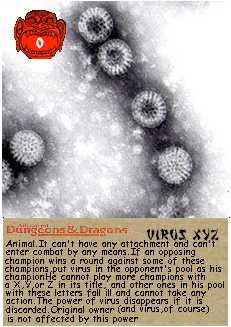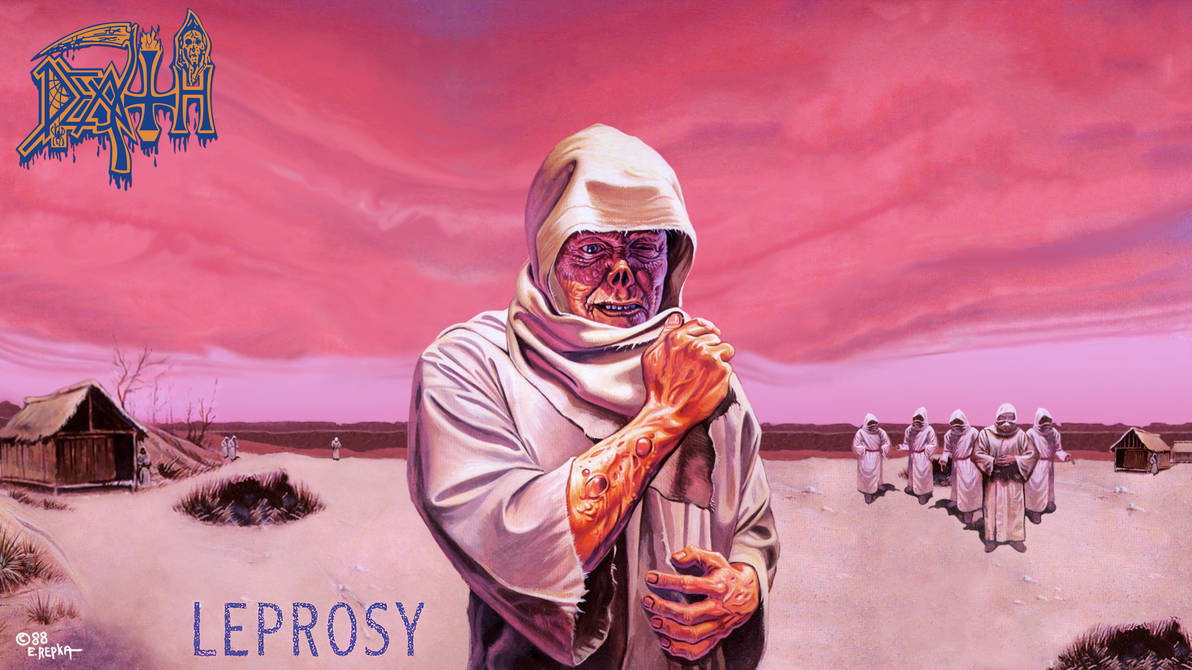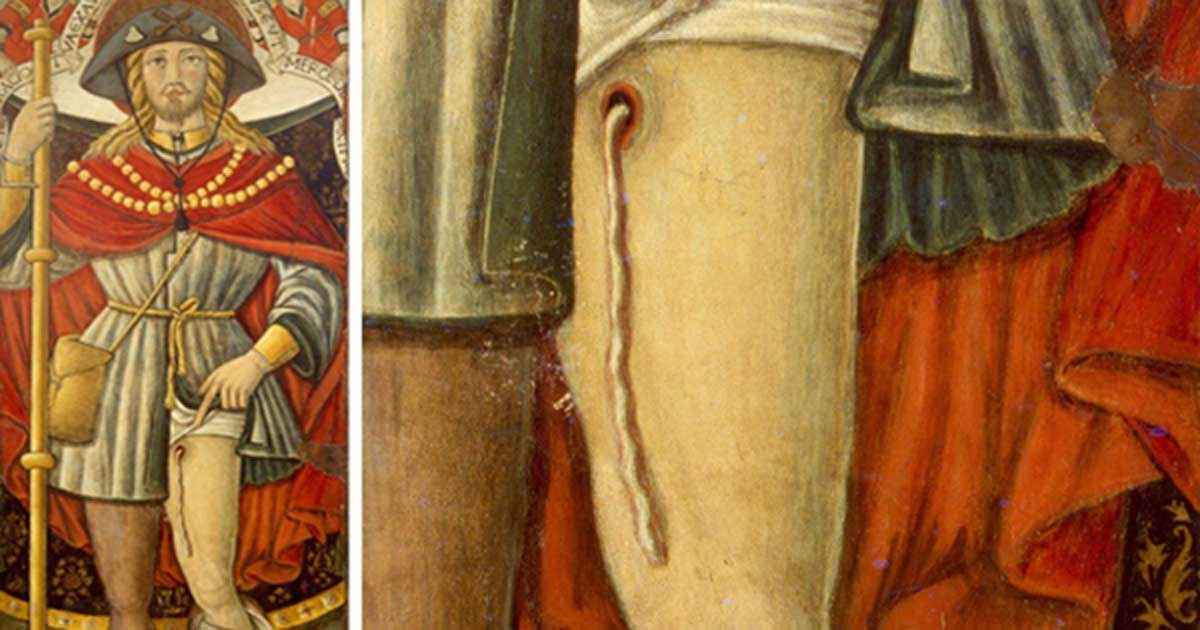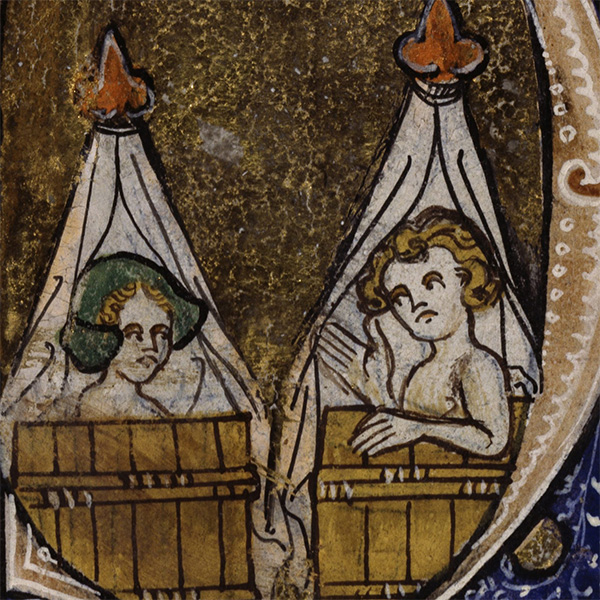Disease-

Disease-

| Character Age, Aging, Disease, and Death | - | - | - | DMG |
| Contraction of Disease | Chance of Contracting Disease | Disease Table | - | AD&&D |
| Contraction of Parasitic Infestation | Chance of Contracting Parasitic Infestation | Parasitic Infestation Table | - | Morgion (god of disease) |
As with poisons, this system
does not attempt a specific treatment of a subject which is beyond its
scope && purpose.
What is done, however,
is to give general categories
of disease and maladies and their game effects,
as well as the chance to
contract an ailment according to the surroundings.
Naturally, you will often
have no need for any random determination of a disease,
as the affliction will be
specified,
but even then you will find
that the random determinants for occurrence && severity might be
helpful.
Contraction
of Disease:
Each game month you may
{wish} to check each character to determine
whether or not he or she has contracted a disease (or disorder).
Check each week if conditions
are particularly favorable:
VERY HOT
WEATHER OR HOT, MOIST WEATHER
FILTHY,
CROWDED CONDITIONS IN WARM WEATHER
Check each and every time
the character is exposed to a carrier in a way which would allow the disease
to be communicated.
Note that disease carriers
can be human, animal, insect, food,
drink, vermin, dirt, filth, etc.
As DM you must indicate
any special disease circumstances applicable.
Talona (goddess of disease)
Contraction
of Parasitic Infestation:
Each game month check for
each character to determine if he or she has become infested with some
form of parasite.
Check each week if conditions
are particularly favorable:
FILTHY
CONDITIONS AND WARM TEMPERATURE
HOT,
MOIST WEATHER
Check each and every time
the character is exposed to a carrier of parasites.
Carriers include humans,
animals, dust, earth, manure, raw (or undercooked) meat, swamp water, etc.
CHECKS ARE MADE BY USING THE APPROPRIATE TABLES SHOWN HEREAFTER.
Myrkul (god of parasites)
CHANCE
OF CONTRACTING DISEASE
2% Base
Chance
Modifiers
| +1% | currently diseased || infested with parasites |
| +1% | crowding (city, encampment, shipboard) |
| +1% | filth (city, encampment, siege) |
| +2% | character is old |
| +2% | environment (marsh, swamp, jungle) |
| +2% | hot && moist climate (season or region) |
| +5% | character is venerable |
| +10% | exposure to carrier of communicable disease |
| -1% | cool weather || climate (high elevation, etc.) <cool = subarctic> |
| -2% | cold weather, high mountains <cold = arctic> <note WSG definition of high mountains> |
| -2% | shipboard after being at sea 2 weeks |
Procedure: Adjust
base chance of disease being contracted by applying modifiers.
When the final percent chance
to contract a disease is found,
roll for each character
concerned.
If disease is indicated,
go to the DISEASE TABLE below to determine what sort
is contracted.
CHANCE
OF PARASITIC INFESTATION
3% Base
Chance
Modifiers
| +1% | filth (garbage, manure, sewage, etc.) |
| +2% | improperly cooked meat |
| +5% | polluted water |
| +5% | swamp or jungle environment |
| -1% | cool weather || climate, desert climate |
| -1% | cool weather, high mountains, cool desert climate |
Procedure: As for
disease, and check PARASITIC INFESTATION TABLE.

Influenza (Dragon #40)
Typhus (Dragon #40)
Black DEATH (Dragon #40)
| -- | -- | Occurence (d8) (+/-) | Occurence (d8) (+/-) | Severity (d8) (+/-) | Severity (d8) (+/-) | Severity (d8) (+/-) | |
| Dice Score | Area of Body Affected | <Examples> | Acute | Chronic | Mild | Severe | Terminal |
| 01-03 | blood/blood forming organs | - | 1-3 | 4-8 | 1-2 | 3-5 | 6-8 |
| 04 | bones | - | 1 | 2-8 | 1 | 2-3 | 4-8 |
| 05 | brain/nervous system | - | 1-6 | 7-8 | 1-2 | 3-5 | 6-8 |
| 06-07 | cardiovascular-renal | - | 1-3 | 4-8 | 1-2 | 3-4 | 5-8 |
| 08-09 | connective tissue | rheumatism? | 1 | 2-8 | 1 | 2-3 | 4-8 |
| 10-12 | ears | - | 1-7 | 8 | 1-6 | 7 | 8 |
| 13-18 | eyes | - | 1-7 | 8 | 1-5 | 6-7 | 8 |
| 19-40 | gastro-intestinal | - | 1-6 | 7-8 | 1-5 | 6-7 | 8 |
| 41-42 | generative organs | - | 1-2 | 3-8 | 1-3 | 4-7 | 8 |
| 43-48 | joints | rheumatism? | 1-4 | 5-8 | 1-6 | 7-8 | - |
| 49-50 | mucous membranes | - | 1-7 | 8 | 1-6 | 7-8 | - |
| 51-52 | muscles | - | 1-5 | 6-8 | 1-5 | 6-7 | 8 |
| 53-65 | nose-throat | - | 1-6 | 7-8 | 1-6 | 7-8 | - |
| 66-85 | respiratory system | - | 1-6 | 7-8 | 1-5 | 6-7 | 8 |
| 88-96 | skin | - | 1-5 | 6-8 | 1-5 | 6-7 | 8 |
| 97-00 | urinary system | - | 1-6 | 7-8 | 1-5 | 6-7 | 8 |
<eg.>
In other words, are 6 different disease
states.
| Acute.mild | Acute.severe | Acute.terminal |
| Chronic.mild | Chronic.severe | Chronic.terminal |
<example of notation: rabies (contracted
from giant bats) is BNS.acute.fatal, in DMG terms>
<Chronic = make a check each month?>
DISEASE (OR DISORDER) TABLE

| -- | -- | -- | -- | -- | -- | -- | -- | |
| Dice Score | Area of Body Affected | Acute.mild | Acute.severe | Acute.terminal | Chronic.mild | Chronic.severe | Chronic.terminal | <Notes> |
| 01-03 | blood/blood forming organs | - | - | - | - | - | - | bubonic plague (The Plague, The Black Death) |
| 04 | bones | - | - | - | - | - | - | - |
| 05 | brain/nervous system | - | - | rabies | - | - | - | - |
| 06-07 | cardiovascular-renal | - | - | - | - | - | - | ebola <?> |
| 08-09 | connective tissue | - | - | - | - | - | - | - |
| 10-12 | ears | - | - | - | - | - | - | - |
| 13-18 | eyes | - | - | - | - | - | - | - |
| 19-40 | gastro-intestinal | - | - | - | - | - | - | cholera (vomiting, diarrhea) |
| 41-42 | generative organs | - | - | - | - | - | - | advanced leprosy <??>, The Jack, etc. |
| 43-48 | joints | - | - | - | - | - | - | - |
| 49-50 | mucous membranes | - | - | - | - | - | - | - |
| 51-52 | muscles | - | - | tetanus | - | - | - | - |
| 53-65 | nose-throat | cold | - | - | - | - | - | - |
| 66-85 | respiratory system | - | - | - | - | - | - | diptheria, blacklung fever (FR0.C60) |
| 88-96 | skin | - | - | - | - | - | - | spotted fever, leprosy |
| 97-00 | urinary system | - | - | - | - | - | - | - |

<
From BLACKMOOR, page 52:
Grippe (colds, flu, belly aches, etc.)
Bubonic Plague (Black Plague or Black Death)
Dysentery
Cholera
Malaria
Small Pox
TB
Typhus
Typhoid Fever
Yellow Fever
Advanced Leprosy
Crud (heat rash, athlete's foot, jungle rot, ringworm)
Spotted Fever
>
<lockjaw: TD30>
<
From MM2, Oinodaemon:
Bubonis, Cholerix, Typhus, and
Diptherius
>
<
Cholera, Plague, fevers
- Goblin rat
>
<From Chivalry & Sorcery
(2e) Sourcebook:
Bubonic plague/Black death
Cholera
Typhus
Typhoid fever
Small pox
Influenza
False alarm
Dysentary
Common cold
Pneumonia
TB
Malaria
Spotted fever
Chicken pox
Septicemia
Peritonitis
Gangrene
Rabies
Leprosy
Rashes
Leprosy of the tomb
>
<
Social Disease,
THE CLAP,
The Jack
>

<notes added, thanks to the good folks at DF (1)>
| -- | -- | Severity (d8) | Severity (d8) | Severity (d8) | <Notes> |
| Dice Score | Parasites Infest | Mild | Severe | Terminal | - |
| 01-10 | cardiovascular system | 1-2 | 3-5
Liver flukes? Hookworms? plasmodium (malaria), trypanosomes (sleeping sickness), hookworms, heartworms, liver flukes |
6-8
filarial worms |
- |
| 11-35 | intestines | 1-2
tapeworm, ascarid worm |
3-7
giardia, intestinal flukes |
8
Giardia lamblia |
- |
| 36-40 | muscles | 1
Botfly |
2-3 | 4-8 | - |
| 41-45 | respiratory system | 1 | 2-4 | 5-8 | - |
| 46-75 | skin/hair | 1-7
Fleas/bedbugs or ticks Ringworm Crabs |
8
Fleas/bedbugs or ticks Screwworm |
- | Typhus (associated with flying squirrels) |
| 76-00 | stomach | 1-2 | 3-7 | 8 | - |

<eg.>
In other words, are 3 different states
of parasitic infestation:
| Acute.mild | Acute.severe | Acute.terminal |
Occurrence determines
whether the disease is a single (acute) attack or
whether the disease will
recur periodically once contracted (chronic).
Chronic
maladies will affect the character periodically,
and if
they occur at the same time as any other malady (disease, disorder, or
parasitic infestation),
the severity
of both will be increased.
Thus,
if two chronic maladies are contracted, the character is not likely to
survive another disease attack.
<'periodically'
(game) : CON check each year (on the same date), or the chronic
disease (etc.) reoccurs at the same severity>
Severity
refers to the seriousness of the disease, disorder, or parasitic infestation
and determines the period of disability
(recovery time or length
of illness which terminates in the character's demise) and the effects
of the malady.
MILD:
During the period of affliction the character is unable to perform strenuous
activities and must rest.
Some
treatment must be determined by the DM to allow a shortening of the period
of illness.
A normal
period is 1-3 weeks.
SEVERE:
A severe malady will lower the character's hit points to 50% of normal
and make
him or her totally disabled for 1-2 weeks,
plus
a further 1-2 weeks of time during which the malady is in the mild state
as the character recovers.
TERMINAL:
The malady will cause death (or loss of the body part or function) in 1-12
days
(longer
periods are stated hereafter in the discussion of the various maladies).
Blood
et
al. afflictions will cause a loss of 1 point each of strength and constitution
per week until totally cured.
Thus,
chronic problems here will slowly wear the character away. Terminal cases
will take 1-12 weeks.
Bone
afflictions are much the same as blood problems,
and
chronic cases and terminal afflictions can be treated in the same way.
Brain et al. problems
will cause a loss of 1 point each of intelligence and dexterity per occurrence
until totally cured,
so chronic maladies will
eventually be fatal. Terminal affliction takes only 1-12 hours for death
to occur.
Cardiovascular-renal
afflictions should be treated in the same manner as blood problems,
except that terminal cases
last only 1-12 days.
Connective
tissue diseases (such as leprosy) permanently remove 1 point each of
strength, dexterity, constitution, and charisma for each month of affliction
- thus only an acute, mild attack will not cause such loss.
Terminal cases will last
until constitution is at 0, i.e. treat them as chronic, severe cases.
Ear afflictions which are terminal result in hearing loss in one ear.
Eye afflictions which are terminal result in blindness in one or both eyes (50%/50% chance for either case).
Gastro-intestinal problems of chronic nature cause the loss of 1 point each of strength and constitution per occurrence until cured, severe attacks causing such loss permanently. Terminal cases require 1-12 weeks for fatality.
Generative organ disorders cause no particular problems except spread of infection . . . . Terminal cases take 1-12 months.
Joint disorders of
a chronic nature cause the loss of 1 point of dexterity,
with each severe attack
causing such loss on a permanent basis.
Mucous membrane problems
of chronic nature cause the loss of 1 point of constitution,
each severe attack causing
such loss permanently.
Muscle disorders of
chronic nature cause the loss of 1 point each of strength and dexterity,
severe attacks having a
25% chance of causing such loss permanently.
Terminal cases take 1-12
months.
Nose-throat afflictions of chronic nature have a 10% chance of causing a 1 point constitution loss each time a severe attack occurs.
Respiratory disorders
of chronic, severe nature are 10% likely to cause the loss of 1 point each
of strength and constitution
(check separately for each).
Terminal cases take from 1-12 months until fatality occurs.
Skin afflictions of
severe nature are 10% likely to cause permanent loss of 1 point of charisma.
Chronic, mild attacks are
also 10% likely to cause such loss, while chronic, severe attacks will
be 25% likely to cause such loss.
Terminal cases will take
1-12 weeks for fatality.
Urinary system disorders
of chronic, severe nature are 20% likely to cause the loss of 1 point each
of dexterity and constitution per occurrence.
Terminal cases will take
1-12 weeks.
Q.
If a character drinks a potion of diminution
will
any parasites shrink
as
well, o rwill they stay at their
original
size?
A.
Thankfully, the parasites -- rot grubs,
for
example, in the Advanced Game
--
will shrink as well. As parasites,
such
creatures are part of the
host's
system, and thus suffer all the
effects
of potions and the like.
Whether parasites are affected by
spells
which have an area of effect of
'one
creature' or 'the creature touched'
is
open to debate. By the exact
wording
of such spells they should
NOT
be affected but, if only for simplicity's
sake,
we suggest that the
Presence
of any parasites is ignored
for
spell purposes. In at least one
case,
parasites must be affected by
'1
creature' spells, otherwise casting
invisibility
on somebody would
produce
a hazy outline of the person,
caused
by bacteria and other parasites <bacterial parasites?>
floating
around in the bloodstream.
(Imagine
#25)
ADJUSTMENTS
TO OCCURRENCE AND SEVERITY DIE ROLLS*
| +2 | CON under 3 |
| +1 | CON 3-5 |
| +1 | chronic disease or disorder |
| +1 | severe parasitic infestation |
| +1 | under 25% of normal hit point total |
| -1 | constitution 10-12 |
| -2 | constitution 13-15 |
| -3 | constitution 16-17 |
| -4 | constitution 18 |
Note: Die score of 0 or less on either roll indicates the character does not contract the disease.
* Not to be used for parasitic infestation determination.
<notes, diseases>
<malaria>
<intestines.giardiasis('beaver
feaver') : beaver, dog, horse, cat, cattle>
<intestines.dysentary>
<
Anthraxus is the most powerful
daemon on the Lower Planes, but his
position is challenged by other
unique daemonic beings, the chief of which
are Bubonis, Cholerix, Typhus,
and Diptherius, along with others
unknown or unrecorded by scholars.
>
<cholera, plague, fevers:
goblin rat>
<again, just notes. the notes are not meant to represent the final level of detail>
<
bubonic plague
cholera
typhus
diptheria
shingles
dengue fever
>
<
shingles
>
<
these are the diseases listed
at BH2.17:
consumption,
grippe,
gangrene,
cholera,
dysentary,
malaria,
smallpox,
typhus,
typhoid fever,
yellow fever,
spotted fever,
tetanus,
rabies,
social diseases
>
<TABLE IVaviii--Disease sub-subtable: (detriment only)
| roll | disease |
| 01-30 | grippe |
| 31-55 | dysentery |
| 56-70 | cholera |
| 71-77 | yellow fever |
| 78-85 | typhus |
| 86-92 | typhoid fever |
| 93-96 | smallpox |
| 97-99 | spotted fever |
| 00 | tuberculosis |
<otyugh
= carrier?>
<otyugh corpse = carrier,
or filth>
<eg. YOU HAVE FOUND TREASURE!
TAKE ||
EXIT
assuming the former ...
1000 gp
WAND
OTYUGH>
<slain creatures should
always appear at the bottom of a treasure list>
<taking a creature assumes
actual rending or vivisection>
<for example, if i take
the otyugh, i might get an otyugh eye, or whatever is listed for an MC>
<shows up as OTYUGH on
the treasure list, but if i TAKE, then it shows up as OTYUGH EYE on my
ITEM list>
<of course, butchering
an otyugh (et al.) is not a very hygenic thing to do>
<these cases should be
noted in the Treasure.Natural section for each monster>
<notes: parasitic infestations>
<notes, carriers, parasitic
infestations>
<note: beaver would incl.
giant beavers>
<note: cat would incl.
all varieties of cat>
<intestines.tapeworm>
Rabies: In
the alcove is a rabid wolf
with bells on its
collar which will attack
once it is freed, as a
4-hit-dice
monster. Anyone bitten must
save vs.
Poison or die in 4 turns. A cure disease
will prevent death.
However, the
victim will still be weak
(-4 on "to hit" and
damage)
for 4 turns. (A1-4.78)

Quote:
Originally Posted by Gentlegamer
Gary, you might find this
amusing:
http://www.enworld.org/showthread.ph...17#post2198417

Well now...
Is the comment below the pic aplause or a warning against sexually transmitted disease?
Cheers,
Gary